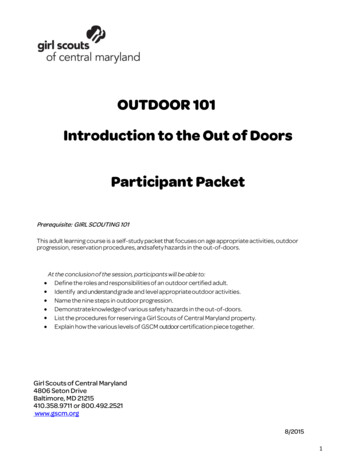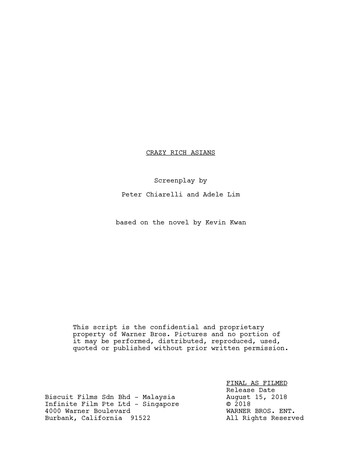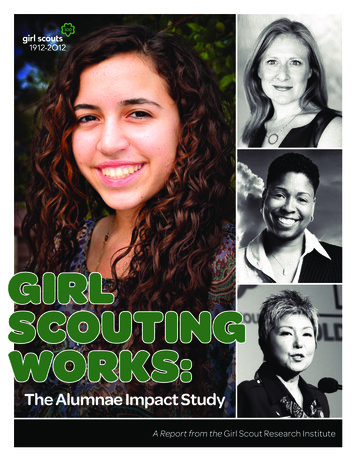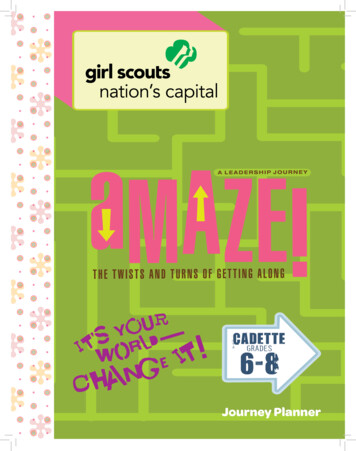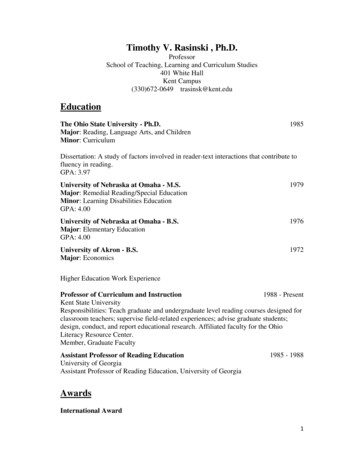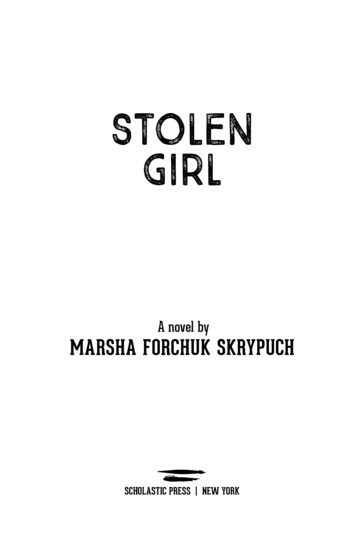
Transcription
STOLENGIRLA novel byMARSHA FORCHUK SKRYPUCHSCHOLASTIC PRESS NEW YORK
Copyright 2010 Marsha Forchuk SkrypuchAll rights reserved. Published by Scholastic Press, an imprint of Scholastic Inc., Publisherssince 1920. scholastic, scholastic press, and associated logos are trademarks and/orregistered trademarks of Scholastic Inc.First published in Canada as Stolen Child by Scholastic Canada Ltd., 604 King StreetWest, Toronto, Ontario M5V 1E1, CanadaThe publisher does not have any control over and does not assume any responsibility forauthor or third-party websites or their content.No part of this publication may be reproduced, stored in a retrieval system, or transmittedin any form or by any means, electronic, mechanical, photocopying, recording, or otherwise, without written permission of the publisher. For information regarding permission,write to Scholastic Inc., Attention: Permissions Department, 557 Broadway, New York,NY 10012.While inspired by real events and historical characters, this is a work of fiction and doesnot claim to be historically accurate or portray factual events or relationships. Please keepin mind that references to actual persons, living or dead, business establishments, events,or locales may not be factually accurate, but rather fictionalized by the author.Library of Congress Cataloging-in-Publication Data availableISBN 978-1-338-23304-910 9 8 7 6 5 4 3 2 119 20 21 22 23Printed in the U.S.A. 23First American edition, March 2019Book design by Yaffa Jaskoll
Chapter One1950—COMING TO CANADAThe woman who said she was my mother was so ill on theship from Europe that she wore a sickness bag around herneck almost the whole time. The man I called father hadcome over a year before us. He had worked in differentplaces in Canada, looking for one that could be our home.He wrote to us that he’d settled on Brantford, Ontario,because of the trees and the two Ukrainian churches.And a foundry that gave him a job—which meant that wecould eat.Because Marusia was so sick on the ship, she spentmost of her time down below. I do not like to feel closed in,so I let her sleep in peace. I was left with lots of time on myown, and I didn’t mind. I would run up the stairs to the topdeck and lean over the railing, watching the water churnfar, far below me. Once, I climbed over the railing and saton the edge, dangling my legs over the open water and1
relishing the cool, clean air. I was there less than a minutewhen a deckhand snatched me by the waist and lifted me tosafety. He yelled at me in a language that wasn’t Ukrainianor Yiddish or German or Russian. It wasn’t English either. Isuppose he told me that I was crazy to be doing such a thing.It didn’t feel crazy. I was finally alone and out in the open, ifonly for a moment. It felt like freedom.When the ship landed at the Port of Halifax, I followedMarusia down the gangplank. I had gotten so used to therolling of the sea that when my feet touched Canadian soil,I thought it was moving. I had to hold on to a post to stopfrom falling. Marusia was unsteady on her feet too. Shewas carrying the suitcase and couldn’t reach the post, soI grabbed her hand and steadied her, then we walked to theend of the long, snaking line of immigrants.At the front of the line stood men in uniform, whointerviewed every newcomer. That scared me speechless.What would they ask me about? What could I say?Marusia squeezed my hand reassuringly. “Rememberto call me Mama.”When it was our turn, the officer looked at our docu-ments, then bent down until he was eye level with me. Hiscraggy face was kind, but the uniform terrified me. Hesaid in Ukrainian, “Welcome to Canada, Nadia. Are youglad to be here?”2
I don’t like to lie, so I didn’t answer but just stared athim through my tears. I was glad to finally be out of thatterrible displaced persons camp we had been in for fiveyears. In some ways, I was glad to be in Canada because itwas so far away from my other life. But there were thingsabout my earlier life that I still yearned for.The immigration officer tugged on one of my pigtailsand then stood up. I listened as he asked Marusia questions about where we came from before the war, and whatwe did during it. I always noticed how easily Marusia lied.The officer asked to see the train tickets that theUnited Nations people had given us. Marusia held themup, not wanting to let them go, but he snatched them fromher and examined them carefully. Only when he seemedsatisfied did he stamp our papers and hand the tickets andour papers back. Marusia folded them with tremblinghands and shoved them through the buttons of her carefully ironed blouse. The man gave her some paper money.“That’s five Canadian dollars. For food,” he said.The port was thick with other people who had losttheir homelands in the war, just like us. Vendors competedwith each other, trying to sell us food. They shouted thingslike “milk,” “apples,” and “bread.” Marusia had tried tolearn some English in the DP camp, and so had I, so wecould understand some of the words.3
Marusia wanted to buy meat sandwiches and a bottleof milk, but she didn’t know the word for sandwich. Whenshe finally got a vendor to understand her, he wanted toomuch money. We needed to be careful so our money wouldlast. I was hungry and thirsty and thought I would die ofheat. But at least we were safe.“I think that is a food store,” I said, pointing to a build-ing with a pyramid of tin cans displayed in the window.The door of the building opened and a man walked out.He carried what looked like a loaf of bread.“Let us try,” said Marusia, pushing me toward the store.When we opened the door, it was even hotter insidethan outside. A rosy-faced man with a barrel belly and ashiny hairless head grinned at us.“Food . . . ?” said Marusia in English, holding the five-dollar bill up for the man to see.“Not much left,” said the man in English, gesturingwith his hands to help us understand.We looked around the store. He was right. The cansarranged in a pyramid had pictures of different vegetableson them. There were sacks of flour and rice. But no bunsor cheeses or sausage or anything that could be eatenwithout preparation.“Bread?” asked Marusia.4
The storekeeper shook his head sadly.We were about to leave when the man’s face brightened.He crooked his finger and we followed him to the back corner of the store. As he opened up a giant box, a whoosh oflovely icy air enveloped us. He pulled out what looked like alarge white cardboard brick. “Ice cream,” he said, grinning.“I scream?” Marusia asked, puzzled.“No, no,” the man said.I was as confused as Marusia. What did this scream-ing thing have to do with bread?The man grabbed the cardboard brick and took it tothe front counter. He frowned in concentration as he shuf-fled through a box under his cash register. Smiling, heheld up two flat wooden spoons. “Now you’ll see,” he said,peeling back a paper layer from the cold brick. A vanillascent swirled toward us.“Ice,” said the man. Then, “Cream.” He took one ofthe wooden spoons and dragged it across the surface of thebrick. A cold ball formed. He poised it on the spoon andheld it to my mouth. “Taste,” he said.I clamped my mouth shut.“I will try,” said Marusia in her careful English. Theman held the spoon to her open mouth and droppedin the cold ball as if he were feeding a bird. Her eyes5
widened with shock. I was so glad that I hadn’t tried itfirst. But then she grinned. “Good!” she said.She rolled a bit onto the other spoon and gave it to me.I touched the strange food with the tip of my tongue. Itreminded me of a snowball. I put the entire spoonful intomy mouth and shivered at the shock of cold, creamy sweetness. It wasn’t just the wonderful taste but the sensation ofcold on a hot, sticky day. It was heavenly.“Five dollars,” said the storekeeper.Marusia blanched. A whole five dollars for this strangenew food? She shook her head.“You eat, you buy,” he said sternly.Marusia reluctantly held up our five-dollar bill. “Butthis is all we have.”The shopkeeper grabbed it from her fingers.“Please,” she said, tears welling up in her eyes.The shopkeeper gave us a pitying stare. He reachedinto his till and took out a one-dollar bill. Marusia took it.We walked out of the store, Marusia clutching ourprecious ice cream to her chest. We were barely halfwaydown the block when she cried, “Oh no. Look!”Her blouse was covered with thick white liquid. “Holdthis,” she said, shoving the ice cream container into myhands. She reached through her buttons and took out ourprecious immigration papers and our train tickets. A6
corner of one form was wet and a portion of the officialstamp was now illegible. The train tickets were damp butnot damaged. She waved them in the air, drying them.Meanwhile, I stood there, watching our four-dollars’worth of ice cream melt in the heat. Marusia gingerlyrefolded the immigration papers and train tickets andshoved them beneath the waistband of her skirt.“Let us sit there,” she said, clutching my elbow todirect me over to a park bench. The minute we sat downshe handed me a wooden spoon. We slurped the ice creamas quickly as we could. By the time we were finished, ourhands and faces were sticky, but I didn’t care. That icecream was the best thing I had tasted in a very long time.We cleaned ourselves off at a public fountain, but Marusia’sblouse no longer looked freshly ironed.I don’t remember all that happened over the next few days.We managed to find our way to the train station. I knew wewere traveling west and I remember switching trains inQuebec City. We stopped long enough in Montreal to finda food store. We only had that one-dollar bill. The ice creamhad been such a costly treat!One of the other immigrants traveling on the trainsuggested that we buy something called Wonder Bread.7
“It’s cheap,” she said. “You could buy three loaves withyour dollar.”So we went into a grocery store and asked the red- lipsticked cashier where we would find Wonder Bread.“Down the aisle,” she said in a bored voice, pointing witha long red fingernail. An entire shelf was filled with fluffywhite loaves wrapped in colorful waxed paper. Marusiatook two. We didn’t dare buy anything to drink, andbesides, there was a water fountain outside. The cashiergave us several coins in change.When we got back onto the train, Marusia opened upone of the bread packages and drew out a couple of slicesfor each of us. It looked like perfect white bread, with asoft golden crust. I held it to my face and breathed in. Ithad no smell. I took a bite. It had no taste. I looked atMarusia. She was chewing slowly, with a puzzled expression on her face. “I wonder why they call this bread,” sheasked. Then she chuckled sadly. “Wonder Bread.”I felt like crying. Would this be the only kind of breadwe could eat in Canada?Marusia patted my hand. “I’ll bake some real breadwhen we get to our new home.”With the motion of the train and my hunger staved offwith Wonder Bread, I drifted off to sleep, dreaming of realbread.8
Our train chugged through Ottawa, then we switchedtrains in Toronto. I was amazed that Marusia could keep itall straight, but each time the train stopped, she wouldshow our tickets to the conductor to make sure we weregoing in the right direction. These trains were enclosed,with soft chairs and big windows—nothing like the flat-cars in Germany. I stared out the window as the citiesflashed by, surprised that there were no bombed-out buildings, no burnt-down cities. Had the war not traveled acrossthe ocean? I guess it was not a world war after all.By the time the train pulled into Brantford, we hadeaten the two loaves of Wonder Bread and I was trulysick of it. At the Brantford train station, I could seeIvan—the man I am supposed to call Father—waitingoutside the station for us. His face was freshly shaved,and his hair was combed back and still wet. His handswere shoved deep into the pockets of a carefully pressedpair of worn gray pants.When we stepped off the train, his face broke into agrin. We were just steps away from the train when hewrapped his arms around Marusia and gave her a loudkiss—right in front of everyone.I tried to pretend I didn’t know them, but then hecaught me up in his arms and hugged me close. I tried topush him away, but he held on tight. “You are safe, Nadia,”9
he whispered. “We will not let anyone harm you everagain.”I would not hug him back but instead went limp. Ididn’t want more of a scene.Ivan grabbed Marusia’s battered old suitcase and putit in the trunk of his big black car. I had no luggage—myfew items of clothing had fit easily into Marusia’s suit-case. We got into the car, just as if we were a real family.I had not been in a car for a very long time. I settledinto the backseat, enveloped in the scent of leather andgasoline . . .A large black car driven by a man in uniform . . .“Nadia, open your window a little and let the breezecool you,” Marusia said. Then, turning back to Ivan in thefront, “Did you buy this car, Ivashko?”“No,” he replied. “It belongs to my boss. He loaned it tome today so you could have a grand arrival to our new home.”Marusia’s eyes crinkled with pleasure and she brushedher husband’s cheek with her fingertips. “That was so verythoughtful of him,” she said. “It reminds me of when wegot married.”I remembered that too. They got married in the DPcamp. Not right inside the camp, but in a little Austrianchurch outside it. The Austrian priest let a Ukrainianpriest from the camp do the service. Afterward, we had all10
taken a taxi back to the camp. That car had been smalland old, the leather seats cracked with age.I settled down for a long ride, but within minutes Ivanturned down a street of mostly older-looking brick houses.I noticed some smaller wooden houses built in between.He pulled up in front of one of these. It looked like it hadjust been built.“You bought a house, Ivashko?” Marusia asked withsurprise.“I bought some land, Marusia,” he answered. “I ambuilding a house.”Marusia and Ivan got out of the car but I stayed sittingin the backseat. What was the matter with me? All thistime, I had wanted the journey to be over. Yearning to behome. But was this really my home?Ivan opened the back door of the car and held out hishand to me. “Nadia,” he said. “I made a swing for you inthe backyard.”Twelve-year-olds are too old for swings, I knew that,but I smiled anyway. It was the thought that counted: Ivantried so hard. I stepped out of the car. Ivan retrievedMarusia’s suitcase from the trunk and the three of uswalked to the front door.Ivan opened the door and set the suitcase inside. Heturned to Marusia with a grin on his face, picked her up as11
if she were a child, and carried her through the door.“What are you doing?” she cried. “Put me down!”“It is a Canadian custom,” said Ivan. “It is supposed tobring good luck.”He set her down on the floor just inside and I followedthem in, thankful that he didn’t carry me over the threshold as well.On the outside the house looked finished, but inside,only wooden boards—Ivan said they were called studs—stood where walls should have been. The floor was plainsanded wood like you would see in a good barn. There wasno furniture.“Let me take my two girls on a tour of their newhome,” said Ivan, grabbing each of us by the hand andgrinning with excitement. Marusia tried to paint a smileon her face, but her eyes showed the same confusion thatI felt.“This is our living room,” he said. Still holding on toour hands, he walked us through an open doorway. “Andthis is the bedroom.”Was there only one bedroom in this house? The roomwas tiny. Barely big enough to fit the two bare mattresseson the floor. Neatly folded bedding was stacked on top.If there was just one bedroom, it would be for Marusiaand Ivan.12
“Will I be sleeping in the living room, then?” I asked.I wouldn’t mind sleeping there. It was more open and airythan this small room.A look of surprise showed briefly in Ivan’s eyes, butthen he answered, “When the house is finished, you willhave your very own room in the attic.” He pointed to asmall roughed-out area above our heads. “And you canchoose the color for your walls.”How would I breathe in such a tiny space? Thankgoodness it wasn’t finished yet. There might be time tochange that. “Where will I sleep until then?”“In the backyard, just like us,” Ivan answered.In the open. Much better!“Now let us continue the tour.”There wasn’t much more to it. Aside from the roughed-out living room and bedroom, there was a kitchen andbathroom and that was it. The bathroom had a sink anda new flush toilet and an old-fashioned iron bathtub with adelicate floral design etched around the edge.“I got that from the dump,” said Ivan proudly. “Canyou imagine that someone threw it out?”A large chunk of enamel was missing from the bottomof the tub, revealing a gash of black metal and a ring ofrust. Other than that, the tub was perfectly usable. What Iwould have given for a tub like this in the camp.13
“That is easily fixed,” said Ivan, following my glance tothe chipped part. “Once the house is finished.”He took us through to the kitchen and we admired thesecondhand electric stove with two burners and a freshlypainted baby-blue icebox. Stacked neatly on top of it werethree clean but chipped dinner plates and three coffeecups, all different. There was an iron frying pan and aknife, fork, and spoon for each of us. Ivan was most proudof the giant kitchen sink and the taps that ran with hotand cold water. “We can do our laundry in that sink too,”he said. “Now, wait until you see our backyard.”Ivan let go of my hand long enough to open the backdoor. We stepped out onto cinder blocks that had beenstacked up to form a step. In the middle of the tiny backyard was a huge oak tree. Hanging from the strongestbranch was a rope swing with a wooden seat.“That is for you, Nadia.”I didn’t want to like it, but I couldn’t help myself.“Thank you!” I said, and then I hugged Ivan. I reallymeant it, which surprised me. I ran out to the swing to seeit up close. The wooden seat was as smooth as velvet. Ivanhad sanded out every stray sliver.Marusia and Ivan stood hand in hand on the cinder-block porch. “Try it out,” she said.14
I loved the feel of the breeze on my face as I pumpedmy legs to make the swing go higher and higher. I feltalmost free. When the swing was at its highest, I could seeinto our neighbors’ backyards. Two doors down was anotherswing in a tree. There was at least one other child on thisstreet, and that was good. Maybe this could be home.15
Chapter TwoIS BRANTFORD HOME?That first night, people came to our house with gifts.There was all sorts of food—good rye bread and holubtsiand sausage. Marusia was given jars of pickled beets, strawberry jam, and honey, as well as eggs and a sack of flour.Someone brought a bolt of light-blue cloth and Ivan wasgiven a bottle of vodka. The priest gave me a prayer book,and an English lady with a mole on her cheek gave me apackage of crayons. Just as most people were leaving, a couple arrived with an angry-looking dark-haired boy in tow.“This is Mychailo,” the woman said to me, pushingthe boy forward. “He’s a student at Central School.”His parents went into the house, leaving Mychailowith me in our yard.“What’s Central School?” I asked him.“You’ll be going there in September,” he said. “You’llhate it.”17
“Why?”“They’ll make fun of you because you’re not Canadian.”“Do they make fun of you?” I asked.“Not anymore,” he said, balling his hands into fists. “Ibeat them up if they do.”It didn’t seem like something that would work for me.Maybe Mychailo would beat people up for me if we becamefriends?After everyone left, Ivan said, “I have another surprise foryou.” He took my hand and walked me to the bushes thatacted as a fence between our yard and our neighbor’s. “Didyou notice what these are?” he asked.There were no flowers—the bushes looked like theyhad just been planted—but I recognized the shape of theleaves. “Lilacs!” I said.“I planted them for you,” he said. “They’ll bloom nextspring and you’ll wake up every morning to their scent.”I was so overcome that I could barely croak out athank you.“This is your home, Nadia,” he said, giving my hand asqueeze. “We want you to be happy here.”We dragged out the mattresses and slept in the backyardunder the stars. The cool breeze soothed me and I loved being18
out in the open. The sound of chirping in the night startledme at first, but Ivan explained that it was the frogs singing,even finding a small one to show me. We had frogs backhome but I couldn’t remember the last time I’d seen one. Afrog’s song is so very different from the sounds of land mines,artillery fire, bombs. How many nights had I tried to sleepdespite all those sounds, all through the war years? And theyears in the camp, even without the din of war, we had livedso crowded in with other DPs that all I could hear were snoresand grunts and sobs.As I lay there, looking up at the stars and listening tothe frogs, I began to relax—just a little. Maybe everythingwould be fine. I took deep breaths of the cool evening airand closed my eyes, but sleep wouldn’t come. Marusiatossed and turned a little bit. She faced me and began tosing the lullaby I had known all my life.Kolyson’ko, kolyson’koKolyshy nam dytynon’kuA shchob spalo, ne plakaloA shchob roslo, ne boliloNi holovka, ni vse tiloI could feel the fear leave my body as I listened to thewords. I was lulled by the coziness of the mattress and19
the bedding and being beside the two people who so far hadkept me safe.I fell asleep feeling loved and secure.I am surrounded by the people whom I love most, snuggledtogether under a down comforter in a cozy bedroom. Suddenly,there is a banging at the door. I try to wake the people beside mebut they have melted away. I am alone. My heart pounds. Thedoor bursts open, but I cannot see who it is.I woke with my arms flailing, shouting, “Leave mealone!” Strong hands pulled me to a sitting position. Iopened my eyes. I was in Brantford, in my own backyard.Marusia sat beside me. I was safe. But even in the darknessI could see the worry on her brow. Ivan was there too,kneeling at my other side.“Were you having a nightmare?” Marusia asked.It had seemed so real, but yes, it must have been anightmare. I nodded.“Do you want to talk about it?”“No.”Marusia snuggled up close to me on the mattress andwhispered the lullaby into my ear in a low, sweet voice.The words soothed me a little bit and I could feel my heartsettle down.I wanted to sleep but I didn’t want to dream again.20
Once my breathing slowed, it was easy to convince Marusiathat I was all right. She and Ivan needed their sleep.Marusia settled back on her mattress. I stayed awake,listening to the frogs and the rhythm of Ivan’s snores.When I knew that Marusia was also deep in sleep, I satback up and breathed in some cool night air to try to clearmy thoughts. Why did I have that dream? Who waspounding at the door?I clasped my arms around my knees and rocked backand forth, soothing myself like someone had once soothedme. I chanted the lullaby under my breath. The wordsmade me feel safe and loved. I reached back into mymemory to the last time I had felt completely safe. Iremembered a time before the camp. I had a bedroom allto myself then, a room with high ceilings and big windows. I had plenty to eat and good clothing to wear.But had I felt safe? No. Who could feel safe in themiddle of a war?21
write to Scholastic Inc., Attention: Permissions Department, 557 Broadway, New York, NY 10012. While inspired by real events and historical characters, this is a work of fiction and does not claim to be historically accurat
